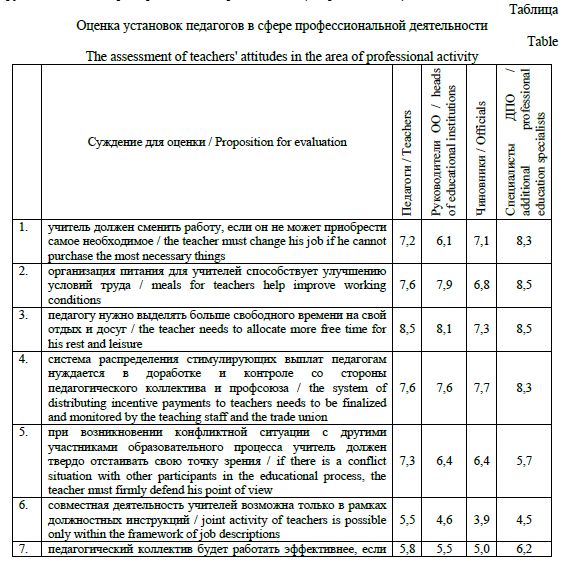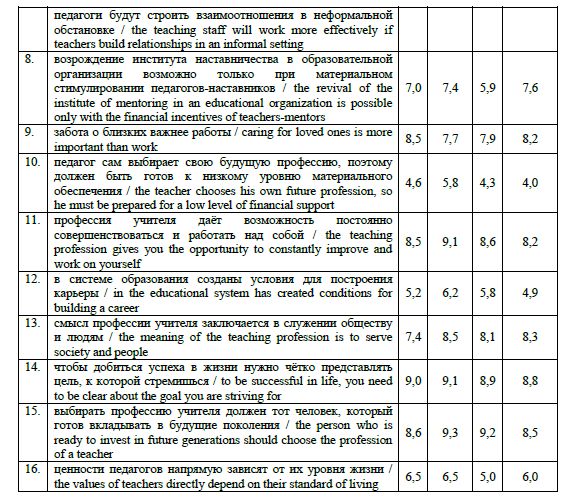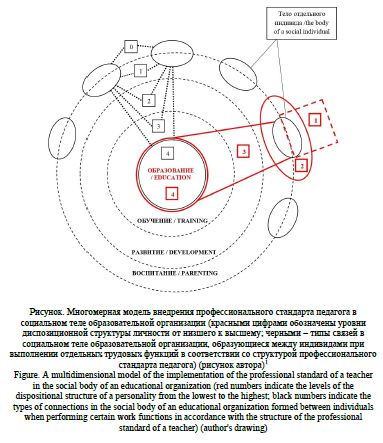Social and managerial mechanisms for the implementation of the professional standard of teachers: attitudes and expectations of employees
Тhe professional development of employees of the education system is an important condition for achieving the quality of education. The state policy in the education includes a whole range of measures aimed at training teachers. The professional standard of a teacher, the national system for the teacher’s growth and the national project "Education" are the most important tools for teachers’ training. At the same time, the achievement of the level of development of professional competencies is ensured through special socio-managerial mechanisms, which have been ambiguously accepted by the professional community. The purpose of the work is to assess the attitudes and expectations of teaching staff, which are formed in the context of the implementation of socio-managerial mechanisms for the introduction of a professional standard of a teacher. Methodology and research methods: the analysis of the implementation of the professional standard of a teacher in the context of the works of P. Bourdieu, V. A. Yadov, A. V. Tikhonov is carried out. The article provides data from surveys of employees of the education system conducted throughout the country and individual regions. The data obtained reflect the attitude of teachers towards the professional standard. The result of the work was the identification some professional and personal attitudes of teachers. A significant role in the work is played by the concern of employees of the general education system about their own financial situation, as well as teachers' awareness of the mission of the profession and their own vocation. The clash of hygienic and motivational factors of teachers' work affects the effectiveness of the mechanisms for implementing the professional standard. The author concludes that the study of personal and professional attitudes of teachers will contribute to improving the effectiveness of the introduction of innovative management tools and the preservation of the existing social structure of the education system.
Figures



Lantsev, V. L. (2025), “Social and managerial mechanisms for the implementation of the professional standard of teachers: attitudes and expectations of employees”, Research Result. Sociology and Management, 11 (1), 227-245, DOI: 10.18413/2408-9338-2025-11-1-1-5.


















While nobody left any comments to this publication.
You can be first.
Blinov, V. I., Batrova, O. F., Esenina, E. Yu., Faktorovich, A. A. (2015), “Professional standards: from development to application”, Vysshee obrazovanie v Rossii, (4), 5-14. (In Russian)
Bykov, R. A., Bykova, E. Yu. (2019), “Social apathy as a form of teachers' adaptation to negative institutional factors”, Vestnik Tomskogo gosudarstvennogo universiteta. Filosofiya. Sotsiologiya. Politologiya, (48), 91-100, DOI: 10.17223/1998863Х/48/9. (In Russian)
Volkov, A. A., Chursinova, O. V., Yaroshuk, A. A. (2020), “Effective management of teacher motivation as a condition for improving the quality of his professional activity”, Gumanitarnye nauki, (1), 135-139. (In Russian)
Golub, O. V., Timofeeva, T. S. (2020), “Features of professional teacher burnout (empirical research results)”, Izvestiya Volgogradskogo gosudarstvennogo pedagogicheskogo universiteta, (1), 28-31. (In Russian)
Egoryshev, S. A. (2023), “Emotional burnout of teachers as a factor in reducing the effectiveness of their professional activity”, Vestnik Rossiyskogo universiteta druzhby narodov. Seriya: Sotsiologiya, 23 (1), 61-73, DOI: 10.22363/2313-2272-2023-23-1-61-73. (In Russian)
Drobotenko, Iu. B., Makarova, N. S., Chekaleva, N. V. (2019), “Modern approaches to the problems of professional education of pedagogical university students”, Vestnik JuUrGU. Seriya «Obrazovanie. Pedagogicheskie nauki», 11 (4), 30-38, DOI: 10.14529/ped190403. (In Russian)
Kornetov, G. B. (2019), “National project “Education”: an innovative context”, Innovatsionnye proekty i programmy v obrazovanii, (5), 6-14. (In Russian)
Korotaeva, E. V. (2018), “Problems of preparation for pedagogical interaction in modern professional standards”, Pedagogicheskoe obrazovanie v Rossii, (2), 28-34. (In Russian)
Lavrentieva, I. V., Tsveliukh, I. P. (2017), “Educational demands of teachers in the context of the introduction of a professional standard”, Vestnik Krasnoyarskogo gosudarstvennogo pedagogicheskogo universiteta im. V. P. Astafieva, (3), 52-65, DOI: 10.25146/1995-0861-2017-41-3-05. (In Russian)
Masilova, M. A., Zhmakina, A. V. (2019), “Application of the HR audit methodology to evaluate the activities of the HR management service in the context of the introduction of professional standards”, Territoriya novyh vozmozhnostey. Vestnik Vladivostokskogo gosudarstvennogo universiteta ekonomiki i servisa, (2), 46-57, DOI: 10.24866/VVSU/2073-3984/2019-2/046-057. (In Russian)
Margolis, A. A. (2019), Professionalny standart pedagoga: razrabotka i ispolzovanie v Rossii i za rubezhom [Professional teacher's standard: development and use in Russia and abroad], FGBOU VO MGPPU, Moscow, Russia, 240. (In Russian)
Merzlyakov, A. A. (2018), “The problem of subjectivity in the sociology of management”, Sotsiologicheskaya nauka i sotsialnaya praktika, (4(24)), 95-104, DOI: 10.19181/snsp.2018.6.4.6087. (In Russian)
Neprokina, I. V., Pchelintseva, T. S. (2016), “Professional standard as a tool for improving the quality of professional activity of teachers”, Obshchestvo: sotsiologiya, psikhologiya, pedagogika, (4), 101-103. (In Russian)
Osipov, A. M. (2022), “Towards the theory of educational policy”, Sotsiologicheskie issledovaniya, (2), 23-33, DOI: 10.31857/S013216250018498-0. (In Russian)
Pakhova, O. A. (2023), “The reasons for young people's choice of teaching profession”, Molodoy ucheny, (41), 45-46. (In Russian)
Pilyugina, S. A. (2022), “The genesis of the subjectivity problem. Issues of formation of teachers' subjectivity”, Azimut nauchnyh issledovaniy: pedagogika i psikhologiya, 11 (2), 31-36, DOI: 10.57145/27128474_2022_11_02_06. (In Russian)
Prokazina, N. V., Lantsev, V. L. (2020), “The role of socio-professional associations of teachers in the context of modernization of the education system”, Vestnik Instituta sotsiologii, 11 (2), 157-173, DOI: 10.19181/vis.2020.11.2.651. (In Russian)
Prokazina N. V., Lantsev V. L. (2023), “Socio-managerial mechanisms for implementing the professional standard of a teacher: features and prospects”, Vestnik Rossiyskogo universiteta druzhby narodov. Seriya: Sotsiologiya, 23 (3), 546-563, DOI: 10.22363/2313-2272-2023-23-3-546-563. (In Russian)
Tikhonov, A. V. (2009), Sotsiologiya upravleniya. Teoreticheskie osnovy [Sociology of management. Theoretical foundations], «Kanon+» ROOI «Reabilitatsiia», Moscow, Russia, 472. (In Russian)
Khertsberg, F., Mosner, B., Bloh Sniderman, B. (2007), Motivatsiya k rabote [Motivation to work], Vershina, Moscow, Russia, 240. (In Russian)
Shamseeva, G. Kh., Akhmetzianova, G. R., Kuvanova, I. Kh. (2022), “On the role of the modern teacher in the educational process: sociological analysis”, Vestnik ekonomiki, prava, sotsiologii, (4), 129-132. (In Russian)
Shevchenko, P. V. (2022), “Changing the status characteristics of a Moscow school teacher”, Sotsiologicheskie issledovaniya, (9), 72-83, DOI: 10.31857/S013216250020284-5. (In Russian)
Shutova, E. A. (2018), “Vocation and remuneration: Public debate and the Legacy of Karl Marx”, Vestnik Chelyabinskogo gosudarstvennogo universiteta. Filosofskie nauki, 48 (5), 83-86, DOI: 10.24411/1994-2796-2018-10511. (In Russian)
Yadov, V. A. (2013), “Samoregulyatsiya i prognozirovanie sotsialnogo povedeniya lichnosti: Dispozitsionnaya kontseptsiya” [Self-regulation and forecasting of social behavior of a personality: A dispositional concept], CSPiM, Moscow, Russia, 376. (In Russian)
Call, K. (2018), “Professional teaching standards: a comparative analysis of their history, implementation and efficacy”, Australian Journal of Teacher Education, 43 (3), 93-108, DOI: 10.14221/ajte.2018v43n3.6.
Collins, J. Hr. (2018), Management in the forensic science laboratory: a 21st century approach to effective crime lab leadership, Academic press, 530, DOI: 10.1016 / C2013-0-19010-1.
Hien, N. T., & Hung, M. V. (2021), “Professional standards training and understanding pre-school teachers’ knowledge about professional standards”, Journal of Asian multicultural research for educational study, 2 (1), 10-15, DOI: 10.47616/yamres.v2i1.116.
Hudson, S. M., Hudson, P., Weatherby-Fell, N. L., & Shipway, B. (2016), “Graduate standards for teachers: final-year preservice teachers potentially identify the gaps”, Australian journal of teacher education, 41 (9), 134-151.
Misra, P. K. (2021), “National professional standards for teachers: retrospect and roadmap, UNIVERSITY NEWS, 59 (26), 3-9.
Tuinamuana, K. (2011), “Teacher professional standards, accountability, and ideology: alternative discourses”, Australian
journal of teacher education, 36(12), 71-82, DOI:10.14221/ajte.2011v36n12.8.